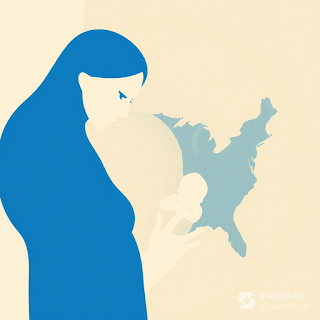1 in 3 mothers in the U.S. report postpartum depression. A new CDC report reveals a worsening mental health crisis that demands urgent systemic action.
😔 America’s Moms Are Struggling: The Alarming Decline in Maternal Mental Health
New research reveals a silent crisis spreading across the U.S.—and it’s hitting mothers hardest.
🍼 Behind the Smiles: A Growing Mental Health Emergency
Motherhood is often romanticized in American culture—pastel nurseries, baby giggles, social media “momfluencers” smiling through matching outfits. But behind those filtered moments, millions of mothers are silently drowning.
According to a 2024 report from the Centers for Disease Control and Prevention (CDC), rates of maternal depression, anxiety, and psychological distress have surged dramatically across the United States in the past five years.
“We are witnessing an unprecedented deterioration in maternal mental health,” said Dr. Carla Dennis, a perinatal psychiatrist at NYU. “And it’s not just postpartum depression—it’s a full-spectrum crisis.”
🔗 Read the CDC's full report on maternal mental health (2024)
📉 The Numbers Tell a Disturbing Story
In the latest CDC data:
-
1 in 3 mothers reported symptoms of postpartum depression in 2023, up from 1 in 8 in 2010.
-
Anxiety diagnoses in pregnant women nearly doubled between 2018 and 2023.
-
Suicide and overdose are now leading causes of death in the first year after childbirth.
-
The highest increases were among Black, Indigenous, and rural mothers—those often facing systemic barriers to care.
This isn’t just a trend. It’s a national mental health emergency, hiding in plain sight.
💥 What’s Driving the Decline?
Experts point to a perfect storm of stressors:
1. Lack of Paid Leave
The U.S. is one of the only high-income countries that does not guarantee paid parental leave, forcing many moms back to work within weeks.
2. Healthcare Gaps
Postpartum care often ends at the 6-week checkup. Mental health screenings? Optional. Therapy or psychiatric referrals? Rare.
🔗 Read: Why the U.S. is failing mothers post-birth (NPR)
3. Economic and Racial Inequities
Poverty, racism in healthcare, and lack of access to culturally competent mental health support disproportionately affect BIPOC mothers.
4. Isolation and the Pandemic Hangover
COVID-19 amplified feelings of isolation and fear during pregnancy and postpartum. Many mothers are still recovering emotionally—even as the world moves on.
“We have more tech, more baby gear, more advice than ever—and moms are still feeling more alone than ever,” says Dr. Maribel Sanchez, a maternal health advocate.
🧠 It’s Not Just the “Baby Blues”
Let’s be clear: this isn’t just a hormonal blip.
Untreated maternal mental health conditions can lead to:
-
Poor mother-infant bonding
-
Lower breastfeeding rates
-
Higher risks of chronic depression
-
Developmental issues in children
And yet, 75% of moms with symptoms go untreated, often due to shame, stigma, or lack of access.
💡 What Needs to Change
This crisis is solvable—but it requires collective action. Experts recommend:
-
Universal maternal mental health screenings during and after pregnancy
-
Mandatory paid parental leave
-
Medicaid expansion for postpartum care beyond 60 days
-
More funding for community doulas, peer support, and culturally competent care
-
National awareness campaigns to normalize asking for help
🔗 Explore Postpartum Support International’s directory for help
💬 What You Can Do—Today
If you’re a new mom: You are not broken. You are not weak. And you’re not alone. Reach out. You deserve care, too.
If you know a mom: Ask how she’s really doing. Drop off a meal. Offer to hold the baby without advice. Listen more than you speak.
If you’re a policymaker or voter: Maternal mental health is healthcare. Support the legislation and funding that recognizes this.
🌱 Final Thoughts: Healing the Village
We often say “it takes a village to raise a child.” But maybe, just maybe—it also takes a village to protect the mother.
Let’s not wait for more data, more obituaries, more missed warning signs.
Let’s build a culture where asking for help is strength, where mental health is standard care, and where no mom is left behind.
If this piece resonated with you, follow for more grounded, research-backed insights on mental health, motherhood, and healing in a complex world.
🏷️ Tags
#MaternalMentalHealth #PostpartumDepression #Motherhood #MentalHealthAwareness #PublicHealth #Parenting #MediumHealth #WomensHealth











Comments
Post a Comment